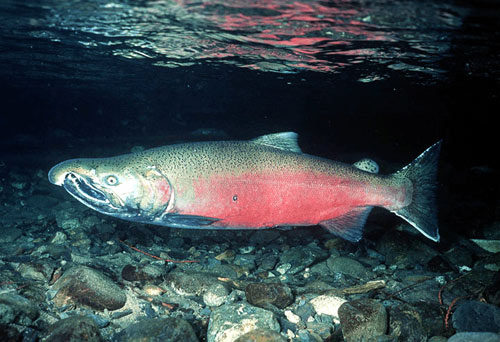 With a final decision by the FDA approving for commercial sales Aqua Bounty Technologies genetically modified salmon, the biotechnology company announced its losses narrowed and its hopes for fresh investors brightened. The former minister of economics for the country of Georgia, biologist and businessman Kakha Bendukidze, is now the largest shareholder.
With a final decision by the FDA approving for commercial sales Aqua Bounty Technologies genetically modified salmon, the biotechnology company announced its losses narrowed and its hopes for fresh investors brightened. The former minister of economics for the country of Georgia, biologist and businessman Kakha Bendukidze, is now the largest shareholder.
The FDA concluded in September 2010 that the fish is safe to eat and poses no threat to the environment and a year later formally backed its commercialization to become the first genetically altered animal approved for human consumption. But getting the AquaBounty fish on dinner tables is still no sure thing. As The New York Times’ Andrew Pollack reported in his recent backgrounder on the debacle, a failure for AquaBounty could hobble or even destroy the still nascent animal biotech industry in the U.S, sending research and jobs overseas.
The salmon has faced relentless opposition from activists who assert that public health is threatened, although there is no evidence to support their position. This kind of anti-science attack is run of the mill for two of the most visible protesting groups—Food Watch and the misnamed Center for Food Safety—but it’s discouraging when joined by Consumers Union, which has moved decisively away from empirical based science in recent years in joining vague but alarmist activist campaigns against a broad range of chemical “endocrine disruptors.” If this troika has its way, the new salmon would be reclassified as a “food additive” rather than a new animal, which would mean starting the approval clock back at zero once again.
Political opportunism has also fueled objections. A group of Senators from western States also petitioned the FDA to scrap approval plans and pledged to cut off funding—not because the salmon is dangerous but precisely because it will do what it is billed to do—open the door for less expensive, and possibly nutritionally enriched salmon that could threaten entrenched salmon fisheries. Simply said, the Senators are putting cronyism ahead of innovation. Encouragingly, and despite cheering by anti-GM journalists at Mother Jones and elsewhere, on May 24, the U.S. Senate narrowly voted against an amendment sponsored by Lisa Murkowski (R-Alaska) that would have required further study before it the salmon could be commercialized.


